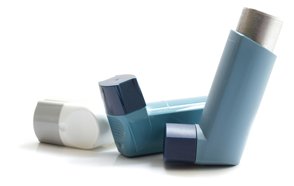Asthma affects millions of people in the UK and also impacts on the lives of people around them. To help you understand more about your asthma or the asthma of someone close to you keep reading.
This page will cover what asthma is, how it is treated, triggers or conditions that can make it worse and what you can do to help avoid them.
What is asthma?

Asthma awareness and self management treatment
The key things to do are to take your prescribed medication regularly and carry your reliever inhaler with you at all times..
- Asthma triggers
- Asthma Medications
- How to take your inhalers
- Asthma Self Management Plan
- Information sheets
What are Asthma triggers?
Everyone has different triggers for their asthma. Common asthma triggers are:
- Viral infections
- Cigarette smoke
- Pollen
- House dust mite
- Animal dander
- Mould
- Change in weather
- Exercise
- Air pollution
If you know what your triggers are then you can try to avoid them however this isn’t always possible. The key things to do are to take your prescribed medication regularly and carry your reliever inhaler with you at all times.
What are the medications used to treat asthma?
Medications to treat asthma include inhalers, tablets and occasionally injections. Below is a list of common medications, click on the name to find out more. Asthma treatment is prescribed in a step wise way with extra treatments added on if symptoms aren’t controlled and reduced when well controlled to make sure we are giving you enough medication to control your symptoms.
Reliever inhalers | Steroid inhalers | Combination inhalers | SMART or MART regimes | Leukotriene receptor antagonist tablets | Theophylline tablets | Steroid tablets | Omalizumab | Bronchial Thermoplasty
Reliever inhalers
Reliever inhalers contain a short acting medication that works by relaxing the muscles around the airways. This causes the airways to open up and improve the symptoms of asthma. These are very quick to work and the effect of these inhalers last up to 4 hours. Reliever inhalers improve symptoms but do not improve asthma over the longer term. Reliever inhalers are usually blue but if you are uncertain which your reliever inhaler is please check with your nurse or doctor. If you need to use your reliever inhaler too frequently, this might be a sign that your asthma control is getting worse. You should check with your nurse or doctor.
Preventer inhalers
Steroid inhalers
Steroid inhalers contain small doses of steroid that act on the airways. The steroid reduces inflammation in the airways and makes the airways less sensitive to irritants. The effects of the inhaler take several weeks to reach its peak but you should start to feel benefit after about a week. It is important to keep taking your steroid inhaler regularly even when you are feeling well because it keeps inflammation under control in the airway.
Steroid inhalers can cause oral thrush (a fungal infection) so it is important to rinse your mouth out or gargle after using the steroid inhaler and make sure you spit out afterwards. Steroid inhalers are usually taken twice daily but sometimes this is different. The important thing is to take the inhaler as it has been prescribed and if you have any questions check with your nurse or doctor.
Combination inhalers
Combination inhalers contain two different medications; a steroid and a long acting version of a reliever inhaler. The two different medications work in different ways. The steroid reduces inflammation and makes the airways less sensitive and the long acting reliever relaxes the muscles around the airways and opens the airway. Combination inhalers are usually taken twice a day but in some people this is different. They need to also be taken regularly. If you have any worries or questions, please ask your nurse or GP. Combination inhalers do contain a steroid so you should rinse your mouth out or gargle after taking the inhaler.
SMART or MART regimes
Some people have their combination inhaler prescribed as both their preventer and reliever inhaler. Usually you take the inhaler regularly twice a day and use extra doses as needed. This is helpful in some people and your doctor will prescribe this if he or she thinks it would be of benefit.
Leukotriene receptor antagonist tablets
This tablet works by blocking substances in the body called leukotrienes from acting on the airway to cause airway constriction and inflammation. They are taken once or twice daily depending on which tablet you have been prescribed. It should be taken regularly and does not contain any steroid. It is not helpful in an acute asthma attack.
Theophylline tablets
Theophylline works by relaxing the muscles around the airway to improve asthma symptoms. It comes in different preparations and it can need blood tests to monitor the levels of the medication in the blood. The dose of the medication may be changed depending on the blood test results. It should be taken regularly as prescribed and the tablets are not helpful in an acute asthma attack.
Steroid tablets
Steroids tablets reduce inflammation in the airways. They are taken in two different situations – in an asthma flare or exacerbation and long term use. In an asthma exacerbation, asthma symptoms worsen and are not relieved by your normal medication. This can be triggered by an irritant or an infection. If this happened you need to see your nurse or doctor quickly. If needed, you will be given a short course of steroid tablets. It is important that you take the tablets as prescribed and go back to your doctor if your symptoms do not improve.
In some people asthma symptoms are uncontrolled despite inhalers and additional tablets and they need long term steroids. If you take long term steroids you should be under the care of a hospital specialist. It is very important to never stop steroid tablets suddenly. This is because when you take steroids long term your body switches off its own steroid production because it is not needed. It takes the body some time to wake up again and start producing steroid if steroid tablets are stopped; therefore long term steroid tablets are always weaned down slowly to allow the body to adapt.
If you take long term steroids it is a good idea to have a steroid warning card (available from your pharmacy) or an alert bracelet or necklace. You also need to tell any doctor, nurse, dentist, pharmacist or paramedic that you take steroids.
When you have an asthma flare up or exacerbation, you will need to take an increased dose of steroid tablets which will be weaned down to your maintenance dose slowly
Omalizumab
Omalizumab is a drug that is licensed for use in people with severe allergic asthma who have frequent flares (exacerbations) despite treatment. Omalizumab is an antibody that binds to a substance called IgE in the blood. In people who have lots of allergies IgE levels are higher and the IgE triggers a cascade that causes inflammation and leads to asthma symptoms. Omalizumab is an injection that is given just under the skin every 2 or 4 weeks. If you have any further questions about Omalizumab then speak to your hospital doctor.
Bronchial Thermoplasty
Bronchial thermoplasty is a new treatment for people with severe asthma and persistent symptoms despite treatment. It works by applying heat energy to the airways to reduce the amount of smooth muscle around the airway. The idea behind this is that smooth muscles contract and cause the airway to narrow and produce asthma symptoms. In people with severe chronic asthma the muscle layer is thicker than in airways of people without asthma.
The treatment is performed using a bronchoscope – a small flexible camera that is inserted into the airway through the mouth. The procedure is usually done under sedation and local anaesthetic. The treatment takes 3 sessions with a few weeks break in between each treatment.
Bronchial thermoplasty is a new treatment so long term outcomes aren’t known yet but in studies it has been shown to improve peoples’ asthma symptoms and the amount their asthma affects their quality of life.
If you have any further questions about bronchial thermoplasty then speak to your hospital doctor.
How to take your inhalers
Please click on the links below to see how to take your inhalers
- MDI (metered dose inhaler) with spacer
- MDI (metered dose inhaler)
- Turbohaler
- Accuhaler
- Easihaler
- Easibreathe
- Autohaler
- Nasal spray
Asthma Self Management Plan
It is important to have an asthma self management plan so you know what medications you take and what to if your symptoms get worse.
Make sure you discuss a self management plan with your doctor or nurse.
Make sure you discuss a self management plan with your doctor or nurse.
House Dust Mite Information Oral Allergy Syndrome Information Latex Allergy InformationMedical conditions related to Asthma
or can make asthma worse
- Medical conditions related to Asthma
- Treatment for Rhinitis and Sinusitis
- Treatment for Gastro-Oesophageal Reflux
What medical conditions are related to asthma or can make asthma worse?
Gastro oesophageal reflux disease
This describes when stomach contents, which can be minute amounts, comes up the food pipe and hits the back of the throat then may go down the wind pipe into the lungs. This causes irritation of the back of the throat, voice box and airways leading to coughing and can trigger asthma causing wheeze, chest tightness and shortness of breath.
You can have reflux even if you don’t have symptoms of heartburn. Sometimes your doctor will organise further tests to look for the presence of reflux. Treating reflux can help to improve asthma control if your asthma is triggered by reflux. Reflux is more common if you are overweight or carry weight around your middle.
Rhinitis and sinusitis
Rhinitis means inflammation of the airways and sinusitis is inflammation of the sinuses. Both these conditions are frequently seen in people with asthma. The symptoms of rhinitis include running nose, sensation of dripping in the back of the throat (post nasal drip), clearing the throat, coughing and blocked nose. The symptoms of sinusitis include feeling of pressure across the cheeks and forehead, blocked nose and running nose.
These symptoms can occur all year round or when you come into contact with an irritant such as pollen. Treating rhinitis and sinusitis can help to improve asthma symptoms.
What medications are used to treat rhinitis and sinusitis?
Steroid nasal sprays
Steroid nasal sprays contain small doses of steroid that act on the nasal passages. The steroid reduces inflammation in the nasal passages and makes them less sensitive to irritants. This reduces symptoms such as running nose, blocked nose and post nasal drip.
The effects of the spray take several weeks to reach its peak but you should start to feel benefit after about a week. It is important that you continue to take the spray even if your symptoms have gone as the spray keeps the inflammation under control. Some people need to take a nasal spray all year round and some only during times of high allergen, for example during the summer.
Antihistamines
Antihistamines are tablets that work by blocking a substance called histamine from acting on cells in the body. Histamine causes symptoms such as inflammation, swelling, itching, running nose and watery eyes. In allergy the body releases histamine inappropriately leading to symptoms.
Some people need to take antihistamines all year round if they are allergic to year round allergens, for example house dust mite and some people only take antihistamines at certain times of year, for example during the summer. If you have any questions about your medication check with your doctor or nurse.
What medications are used to treat gastro oesophageal reflux disease?
Proton Pump Inhibitors (PPIs)
Proton pump inhibitors are medications that reduce the acidity of the stomach contents. Your stomach is continuously producing acid to help with digestion. PPIs work by blocking the action of a pump on the cells that pumps acid into the stomach; this makes the stomach secretions less acidic.
The benefit of reducing the acidity of the stomach is that it is less irritant to the delicate tissues in the throat, voice box and lungs if reflux occurs. If you get symptoms of heartburn then this also reduces with a PPI, again because the stomach content is less irritant to the food pipe.















